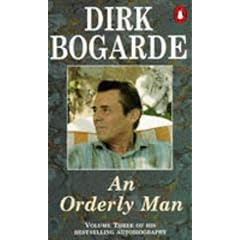
In An Orderly Man, which is a sequel to two earlier memoirs, Snakes & Ladders and A Postillion Struck, he documents his life from his late '40s into his '50s. Tired of the hectic life of an actor, he buys a small run-down house in France (which is the frame and organizing concept of the memoir). The house needs extensive renovation. He hires an architect to redesign the house, which the architect explains has been neglected for 500 years. While Bogarde is away finishing a film (he retires only occasionally), the architect and contractors finish the house.
His account of what happens next is humorus yet despairing. Everything that can go wrong did. The moving truck smashes half his possessions, the pond that he paddles around in turns out to be leaking sewage, and his topsoil was limestone and dust.
But the lack of electricity is the worst thing.
“It was August, the middle of the biggest French holiday. Not a hope of finding an electrician, let alone one who knew where the main cable might run. We continued unloading the vans as fast as possible, all thoughts of a refreshing bath banished, no light, and presumably no heat to cook.”
Of course all that is soon taken care of, and he lives quietly for two years in the well- loved house, working in his garden and entertaining his family. He also begins to think of writing. Amazingly, almost as in 84, Charing Cross Road, he corresponds with a brilliant old woman ( who once lived in his english house, who helps him fill the gaps in his literary education, returns his letters with grammar corrections, and shares his life at a distance.
The house in France gives him the quiet he needs to write.
He goes back to work after two years because he needs money. He works on many commercial films, but he also writes about working with Visconti on “A Death in Venice” (he writes about the concentration demanded by his role, but he’s fabulously funny about his co-star, who has been buillied into acting by his grandmother and cares about nothing but motorcycles).
Then he is very proud of his work on Liliana Caviani’s “The Night Porter,”which sounds agonizing: about an SS man and a non-Jewish woman in a concentrration camp who falls in love with him. Cavani, Bogarde, and his costar, Charlotte Rampling were sued for obscenity in Italy. They won their cases, but this is the kind of art film he tended to be involved with.
1 comment:
Your blogs are so interesting. I really envy you the freedom you give yourself to read the best and intriguing as they come to you.
I saw _Night Porter_, a tough film, despairing and unforgettable. It's theme seems to be the irresistibleness of destructive behavior. I've seen a number of Bogarde films; the one I resaw after a long time was _Master and Servant_. Alas it didn't hold up; it seemed clunky and melodramatic, but the first time round I never forgot. The servant becomes the master (as in the real life situation Diana Spencer Cavendish became dominated by Elizabeth Foster, her paid companion and her husband's mixtress). _King and Country_ is another masterpiece by him.
It's comforting to know there are souls like him in the world so thanks for the review.
Ellen
Post a Comment